Diversity, Equity, and Inclusion
Management Approach
Our Basic Stance
Against the backdrop of factors such as the growing number of businesses seeking to expand globally and stronger international competition, as well as addressing the lack of people in the labor force due to a decline in the population of developed countries, including Japan, people’s views regarding careers and workstyles have become more diverse than ever before. We believe that diversity and inclusion (D&I) is crucial for the Kawasaki Group to sustainably improve its enterprise value in such an environment. D&I is a concept that aims to bring together people from diverse backgrounds regardless of nationality, gender, age, religion, or disability; to allow each employee to fully realize their diverse capabilities while maintaining an awareness of mutual acceptance and recognition of others; and to create an organization that maximizes these efforts. From fiscal 2024, we are helping to ensure that everyone has equal access to opportunities to challenge themselves with the addition of E (equity), representing fairness. Based on this recognition, the Kawasaki Group is proactively implementing various initiatives to promote diversity, equity, and inclusion.
Vision for Our Organization
People with a variety of attributes, including those with disabilities, non-Japanese, and senior staff work at the Kawasaki Group. We are undertaking activities to “promote the active participation of women,” “support employees balancing work with childcare and nursing care,” “support the active participation of non-Japanese employees,” “promote understanding of LGBT issues,” and “realize workstyles with an awareness of work-life balance, results, and efficiency,” in order to bring together the capabilities of employees with these various attributes and realize our vision of “Trustworthy Solutions for the Future.” In addition, the Kawasaki Group Code of Conduct declares that we respect diversity and strive to build a workplace in which all employees can live up to their full potential.
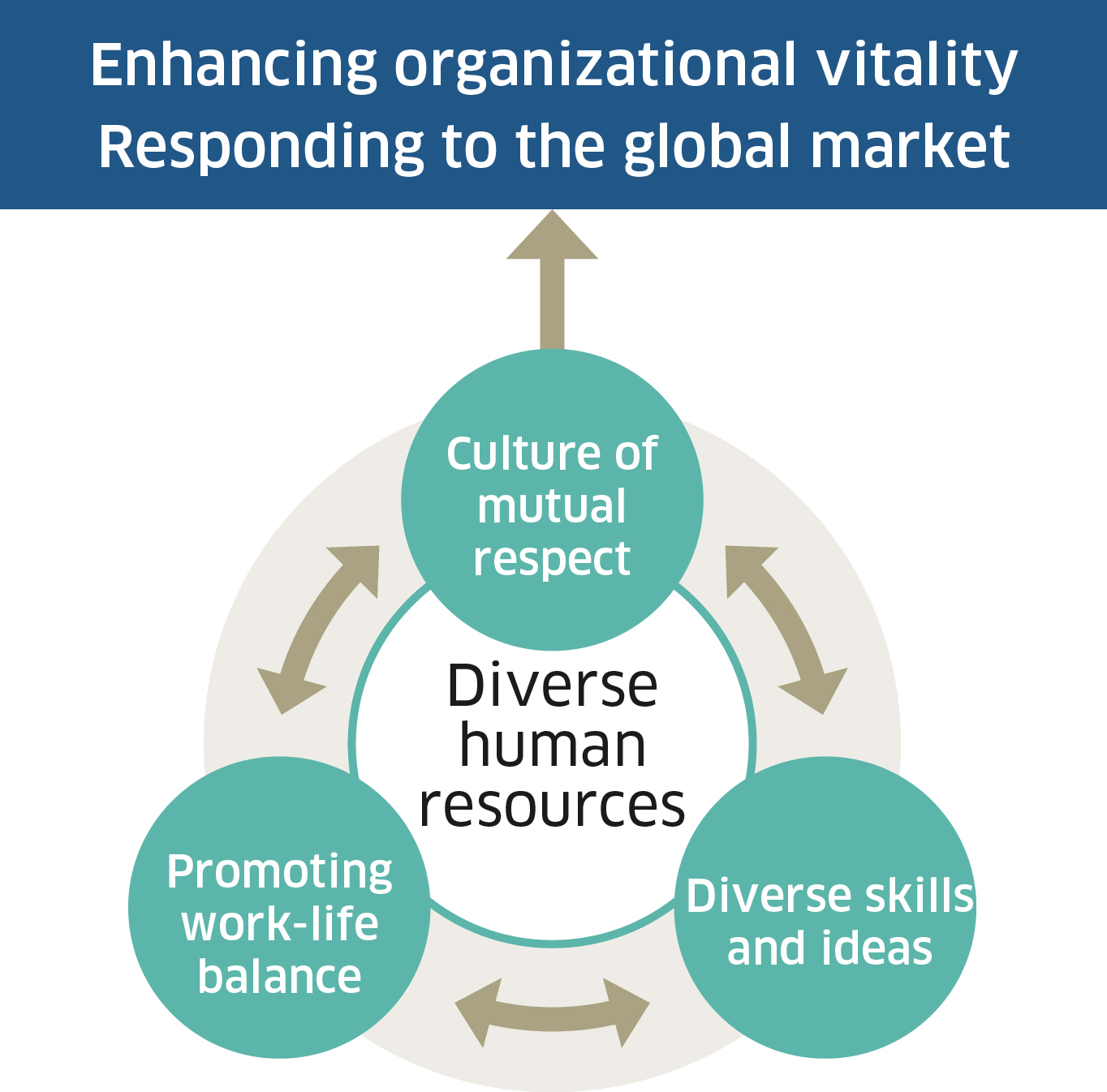
Structure
The Company established the DE&I Management Section within the Head Office Human Resources Division to undertake various measures for promoting diversity, equity, and inclusion. Various measures are discussed by the Management Committee, HR Management Committee, or other bodies and then reported to the Board of Directors. In addition, the Head Office Human Resources Division maintains various meetings and committees in which division managers in charge of human resources and labor at the business segments convene to gather views and opinions on the drafting of detailed human resource initiatives and communicate Company-wide policies.
|
Promoting Diversity and Inclusion
Promoting the Active Participation of Women
The Company is focused on promoting the active participation of women and continuously encourages active recruitment of women with targets of raising the proportion of women in career-track administrative positions to at least 40% and in career-track technical positions to at least 15% among newly hired graduates. We also set a target to increase the proportion of women in managerial positions to 10% by fiscal 2030. With the aim of facilitating the retention and fostering an awareness of career enhancement for female employees, we host the “DE&I Forum” for female managers to exchange views on the active participation of women at the Company through a message from the President and a panel discussion among female officers. We also gain insights on facilitating growth from role models outside the Company, and host the “Female Leadership Development Program,” “Networking Session for Female Engineers,” and “Cross-Industry Networking Event for Women Working in the Kansai Region” in cooperation with Kobe-based companies, toward building human networks outside the company. Furthermore, the Company is actively undertaking activities for the recruitment of female engineers. This included conducting workshops as part of the “Training Program for Female Engineers,” in collaboration with universities. Starting in fiscal 2025, we introduced the Kawasaki Women’s Advanced Program for all women in section manager equivalent positions and formulated individualized development plans tailored to each person in order to accelerate measures for building a development pipeline for women who can become candidates for managerial positions and even officers. In addition, we plan to expand the scope of the program to senior manager equivalent and assistant manager equivalent positions starting in fiscal 2026 to expand support for career enhancement of women even further.
New Graduate Female Hires for Administrative and Technical Positions* and Percentage of Women among All New Graduate Hires for Administrative and Technical Positions (Kawasaki Heavy Industries, Kawasaki Railcar Manufacturing, and Kawasaki Motors)
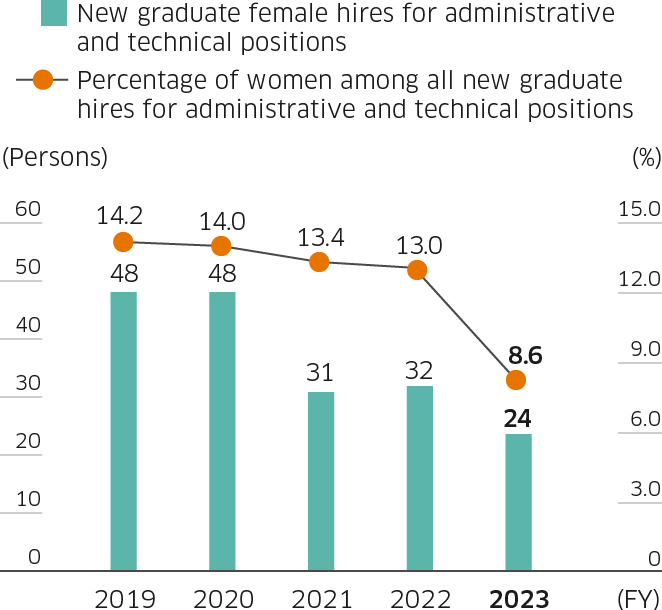
* As of April 1 of each fiscal year.
Promoting the Employment and Active Participation of Non-Japanese Nationals
Kawasaki launched a regular hiring program for non-Japanese new graduates in fiscal 2012 and continues to recruit from countries around the globe, including Korea, China, Sweden, and India. To improve communication between non-Japanese employees and their supervisors and co-workers, as well as to enable supervisors and co-workers to better understand non-Japanese employees who have different educational, cultural, and other backgrounds, Kawasaki creates and distributes guidebooks for workplaces that non-Japanese employees will be joining and organizes seminars on multicultural understanding for supervisors as well as training programs to help employees from other countries understand the Japanese business environment.
Promoting Participation by People with Disabilities
We are committed to hiring more people with disabilities, and they participate in a wide range of workplaces. In September 2013, we established our special subsidiary Kawasaki Heartfelt Service Co., Ltd., which promotes the active Group-wide employment of people with disabilities in order to maintain and improve their employment rates, with the employment of persons with disabilities standing in excess of the legally mandated employment rate, at 2.63% for fiscal 2025. We are additionally working actively to create barrier-free workplaces, and will cultivate an environment in which people with disabilities are able to develop to their full potential.
Employees with Disabilities*1 *2 and Percentage of Employees with Disabilities (Kawasaki Heavy Industries, Kawasaki Railcar Manufacturing, and Kawasaki Motors)
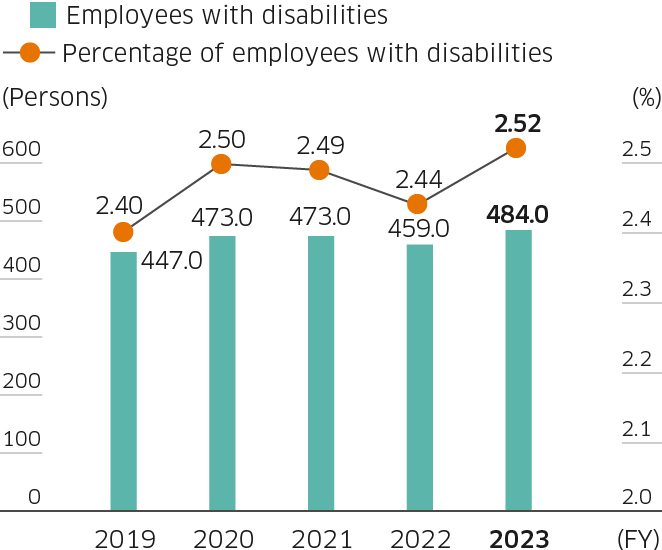
*1 As of June 1 of each fiscal year. Respective results include those for special subsidiary Kawasaki Heartfelt Service Co., Ltd.
*2 People working short hours are calculated as 0.5 persons. One person with a severe disability is counted as two persons.
Support for the Active Utilization and Participation of Senior Human Resources
Kawasaki extended its mandatory retirement age based on the mandating of the amended Act on Stabilization of Employment of Elderly Persons, and many of our veteran employees remain actively involved in operations while also passing down their skills by using the experience they have accumulated to date. Furthermore, we hold career seminars for employees in their 50s to assist them in identifying their strengths and allow them to rethink their workstyle options going forward.
LGBT-related Efforts
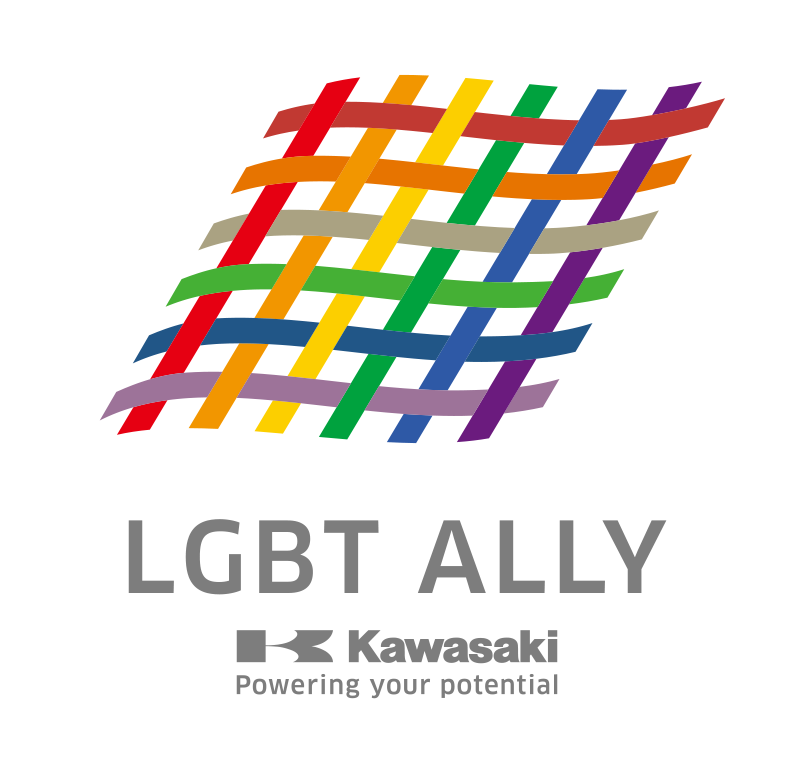
Aiming to create an LGBT-friendly workplace, we are striving to raise employee awareness by sending out messages from the President, holding in-house seminars, issuing an LGBT handbook to be used in employee education, distributing the “Kawasaki LGBT ALLY Mark” to help employees express their support of LGBT individuals, and participating in relevant external events. As of the end of fiscal 2024, approximately 1,300 employees had endorsed ALLY. Moreover, we formulated the “Kawasaki Declaration of Action in Support of LGBT,” which provides employee conduct guidelines, clarifying Kawasaki’s basic stance and action principles to be observed by all employees. Kawasaki Heavy Industries introduced rules on the registration of same-sex partners in fiscal 2020 and the choice of “business names” (a name other than one’s legal name) in fiscal 2022. Based on these rules, employees who have same-sex partners and meet prescribed conditions are now deemed legally married and treated as such. Additionally, employees are allowed to work based on their gender identity. In this way, we are endeavoring to develop a structure to advocate for equal rights for LGBT individuals both at their workplaces and in their private lives.
Initiatives on Unconscious Bias
Since fiscal 2020, the Company has held a total of 11 in-house seminars to consider diversity and inclusion for employees who wish to participate, and starting in fiscal 2025, this program was replaced with Cradle, a video distribution service for promoting DE&I and healthcare for all Group employees. Employees are able to watch seminar videos on a wide range of topics, such as unconscious bias, psychological safety, and health, at any time and from anywhere to deepen their knowledge of DE&I and healthcare. Through the introduction of Cradle, we will create workplace environments where Group employees can work with enthusiasm and link this to further enhancement of well-being.
Work-Life Balance
Work-life balance is the foundation for promoting diversity and inclusion, allowing diverse employees to exercise their strengths. To sustainably increase enterprise value, it is crucial to create highly productive workplaces where diverse employees can creatively use their abilities while maintaining a good work-life balance. Within the Kawasaki Group, it is therefore important to create environments in which employees can do work that meets the expectations of the Company, those around them, and themselves while leading healthy, fulfilling lives, so that they can engage with their work at a higher level. By providing diverse workstyle options that enable employees to balance their professional and private lives, we will systematically improve work efficiency.
Supporting Employees Balancing Work with Childcare and Nursing Care
Kawasaki provides support in a number of ways to enable employees to continue working actively while balancing work with childcare and nursing care. Many related systems go beyond national government standards, such as a system of childcare leave available until employees’ children reach age three; a reduced working hours system available until employees’ children graduate from elementary school; nursing care leave available for up to three years; and a system that lets employees take time off in one-hour units as needed for childcare or family nursing care. In recognition of these systems, in 2010 Kawasaki was certified as a company supporting childcare and awarded the Kurumin Mark. Other initiatives include the Supplementary Work Day Nursery Service, which provides temporary childcare services within the Company for employees working on days that they would normally have off; the Childcare Rescue System, offering Company-designated baby-sitter services that employees can use when their children are sick or recovering or when they are working overtime or on business trips; a concierge service to help employees find nursery schools; seminars to support employees taking childcare leave who wish to return to work; and career seminars for dual-income married couples. We continue working to enhance such initiatives for employees with children. Moreover, in order to foster a corporate culture in which employees are not leaving their jobs due to such reasons as childbirth or childcare and in which both men and women are able to balance work with childcare as desired, we have set the target of raising the rate at which male employees take childcare leave to at least 50% by fiscal 2025. We are also proactively working to raise awareness through seminars to promote and support the involvement of men in childcare, as well as seminars for employees returning from childcare leave and their supervisors to ensure that our employees, with their diverse attributes, have the option to choose from a diverse variety of work styles.
Rate at Which Male Employees Take Childcare Leave
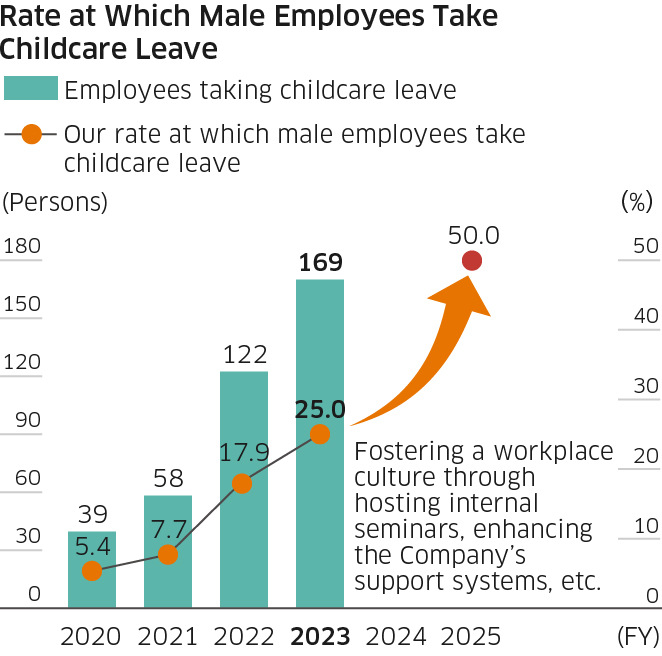
Support Systems (Kawasaki Heavy Industries, Kawasaki Railcar Manufacturing, and Kawasaki Motors)
| Parental leave before and after birth | Maternity/paternity leave | Employees may take leave until a child reaches the age of three. There is no limit on the number of leaves taken. |
| Nursery school enrollment concierge | Provides services to help employees taking childcare leave enroll their children in a nursery school. | |
| Childcare leave and leave to care for sick/injured child, etc. | Employees may take 10 days per year per child until the child completes elementary school, and up to a total of 20 days in the case of two or more children (legally, companies are only required to provide a total of up to five days per year for one child or 10 days per year for two or more children). | |
| Annual paid leave taken in hourly increments (for childcare) | Employees may take annual paid leave in hourly increments (equivalent to two days or 16 hours per year) when necessary due to morning sickness or for childcare (up to completion of elementary school), or to care for a sick/injured child. | |
| Accumulated leave* | Employees may use accumulated leave to care for a young child (up to completion of elementary school), care for a sick/injured child, or when morning sickness interferes with job duties. | |
| Use of flextime system | Employees working in departments not eligible for the flextime system may work on a flextime basis as necessary when looking after a young child (up to completion of elementary school) or when morning sickness interferes with job duties. | |
| Limits on out-of-hours work and work on days off | Employees may be exempted from out-of-hours work and work on days off until a child completes elementary school. | |
| Reduced working hours system to care for young child | Standard working hours can be reduced up to a maximum of three hours a day until a child completes elementary school. (Employees caring for children with disabilities or children requiring medical care are entitled to apply for reduced working hours until March 31 of the fiscal year in which their child reaches the age of 18.) |
|
| Congratulatory leave (condolences leave) | Employees are eligible to take five days leave during the prenatal period of six weeks (14 weeks in the case of multiple pregnancies) preceding and the postpartum period of eight weeks following the birth of a spouse’s baby (however, in cases in which childbirth occurs in advance of the prenatal period, the five days may be taken from two days before the date of birth). | |
| Kawasaki Childcare Rescue System | Subsidies are made available for employees with children for babysitting services by Company-designated childcare providers to cater to sickness or recuperation of children, as well as business trips and overtime work. | |
| Supplementary work day nursery service | Nursery services by Company-contracted childcare providers at an on-site or nearby day care facility are available for days when the company calendar calls for a supplementary work day. | |
| Family nursing care | Nursing care leave | Employees may take leave up to three times for one person requiring nursing care (three years at longest). |
| Limits on out-of-hours work and work on days off for nursing care | Employees may be exempted from out-of-hours work and work on days off up to once a year. | |
| Special leave for family care | Employees may take special leave of 10 days per year per family member requiring nursing care, up to a total of 20 days in the case of two or more family members requiring nursing care (legally, companies are only required to provide five days per year for one family member or 10 days per year for two or more family members). | |
| Annual paid leave taken in hourly increments (for nursing care) | Employees may take annual paid leave in hourly increments (equivalent to two days or 16 hours per year) when necessary to care for an ailing or elderly family member. | |
| Accumulated leave* | Employees may use accumulated leave whenever necessary to care for an ailing or elderly family member. | |
| Use of flextime system | Employees working in departments not eligible for the flextime system may work on a flextime basis as necessary when looking after family members requiring nursing care. | |
| Reduced working hours system for nursing care | Employees may shorten their working hours for at longest two hours a day until the grounds for care cease to apply. | |
| Other | Request for reemployment | Employees who resign to care for a child or an ailing/elderly family member may apply to be rehired when a change in their situation allows them to return to work. |
* Accumulated leave refers to unused annual paid vacation days that cannot be carried over to the next year (up to 60 days) but can be taken in such circumstances as personal injury or illness, childcare, caregiving, or nursing.
Workstyle Reform
Kawasaki has promoted organizational and corporate culture transformation, system transformation, and operational transformation through K-Win activities, which were initiated as a means of reforming workstyle. To promote organizational and corporate culture transformation, we have issued messages from top management, provided educational seminars for managerial staff, and held one-on-one meetings. In system transformation, in fiscal 2018 we introduced a remote working program (teleworking program) for all employees, and are undertaking initiatives to create a working environment that allows employees to work flexibly in ways aligned with their own lifestyles. In terms of operational transformation, we have provided the Operational Efficiency Improvement Start Book as well as useful information for operational transformation, including tools for various types of work. Currently, the scope of K-Win activities to reform workstyle is being expanded to include “activities to change the corporate culture and employee awareness,” toward the realization of Group Vision 2030. Meanwhile, we are also working to mitigate, to the bare minimum, increases in the number of employees even during growth stages of our business by visualizing and improving the efficiency of work processes through the deployment of robots and AI as well as through digital transformation. At the same time, we are committed to realizing workstyle which enable employees to experience a real sense of satisfaction and growth by focusing on high value-added work.
Encouraging Employees to Take Their Annual Paid Leave
Kawasaki encourages employees to take their annual paid leave to enable them to mentally and physically refresh themselves and to draw a clear line between work and private life by taking their leave in a planned manner. To this end, Kawasaki implements two programs: the Two Consecutive Holidays and the Anniversary Holiday programs. Under these programs, employees designate a total of three paid leave days at the beginning of the fiscal year and can take these days off without fail. Additionally, based on the labor agreement, three annual paid leave days that the Company designates are taken by most employees in August. The Company combines this midsummer break with other Company holidays and a national holiday to create a span of nine consecutive days off. Furthermore, the labor union and management have agreed to designate one day per week as an on-time exit day since fiscal 2006. The designation of this on-time exit day helps employees work efficiently and improve their work-life balance.
Other Initiatives
Diversity and Inclusion Symbol

The Kawasaki Diversity
and Inclusion Symbol
Kawasaki has adopted a diversity and inclusion symbol. This symbol imagines Kawasaki as a tree made up of a great number of diverse individuals. For this tree to grow healthily, its leaves and fruit must become more colorful and rich. We who work at Kawasaki see value in expressing our diverse colors—our unique personalities and skills—and seek to do so together within Kawasaki to grow as individuals and as a company. This is the message conveyed by the diversity and inclusion symbol.
Diversity and Inclusion Promotion Website
We have set up a diversity and inclusion promotion website on the Company intranet. This website offers an overview of diversity and inclusion at the Kawasaki Group alongside workplace examples and information about systems related to facilitating a healthy work-life balance.
External Network
To accelerate social shifts related to diversity, inclusion, and work-life balance, we proactively look beyond the framework of the Company to encourage employees to participate in outside seminars and advance activities together with other organizations and companies. One example is a work-life balance and diversity and inclusion promotion study project being jointly implemented by the Chuo University Graduate School of Strategic Management and private companies. This project broadly promotes the concept of healthy work-life balance in society through surveys and research. We also actively exchange information with DE&I promoters from various companies as a means to share challenges and best practices.
TopicEnhancing On-site Nursery FacilitiesKawasaki Motors Enterprise (Thailand) Co., Ltd. opened an on-site nursery in April 2010. The nursery provides care for employees’ children between the ages of one and four. Each year, the nursery cares for the children of about 30 employees on a daily basis. Several other children are also registered at the nursery, so that their families can utilize it when necessary. The nursery is generally open from 7:30 to 17:15 to coincide with regular working hours, but, if requested by more than a certain number of employees, it is also made available during overtime hours or on holidays. In Japan, Kawasaki established workplace nursery facilities for days that employees have to work but would normally have off in order to provide temporary childcare services, and starting in April 2025, we opened an on-site nursery school at the Gifu Works. By opening workplace nursery facilities and establishing other programs that facilitate an early return to work, employees can continue working with complete peace of mind by leaving their children to be cared for within the office premises. From the employer’s viewpoint, this helps avoid the loss of skilled human resources due to childbirth or childcare responsibilities, promoting a stable and committed workforce. The opening of the nursery has thus proved to be mutually beneficial to both employees and the company. 
|
Contact
If you need more information about our business,
please feel free to contact us.





